BACK TO finale_winnerS
Honourable Mention Award
KHWENDO KOR (SISTER'S HOME)
Sister’s Home Place-making through creation of an opportunity and learning centre for Afghan refugee women in Karachi, by capturing the essence of a “Hujra”. A refugee lives through 2 wars, one that is going on in their homeland, and the other that is waged against them at their host country where they are labelled as […]

Sister’s Home
Place-making through creation of an opportunity and learning centre for Afghan refugee women in Karachi, by capturing the essence of a “Hujra”.
A refugee lives through 2 wars, one that is going on in their homeland, and the other that is waged against them at their host country where they are labelled as “others”. Away from their “legal-homeland”, their inter-community bonds are broken, power dynamics and social hierarchies are further amplified; leading them to question their own role in the society, they feel placeless.
After 43 years of Pakistan hosting Afghan refugees, the refugee camps have transformed into informal settlements, with their own ecosystems. In Karachi’s Afghan Basti, the ungoverned eco-systems strongly govern, and control the lives, movement and opportunities of women in the basti. They have no place to seek refuge in the entire refugee camp.
The project explores place-making through the creation of a “sister’s home”, a community centre for women, that helps reestablish broken inter-community bonds. It helps validate their citizenship and right to living and personal growth, as it’s a permanent structure made exclusively for them, in an “impermanent camp”. It aids in creating a sense of belonging, by understanding the phenomenology of Afghan spaces and culture. The process is participatory, and place-making is achieved through creation of multi-purpose and multi-functional communal spaces.
Simultaneously it gives them agency to reshape their lives as it will provide spatial and financial agency. This was done keeping in mind the language of space, how the spatial order, proximity, organisation all dictate the relationship between the people occupying it, as well as the relationship between the space itself and places surrounding it.
PUSHING THE RESET BUTTON:
The “Sister’s Home” is a place by the women for the women. A sense of belonging is created as the space becomes a rostrum for creation of ‘tangible cultural heritage’ and ‘intangible cultural connections’, through a series of interconnected courts and pavilions.
Economical Reset-
Although a flexible space, the main program of the project is an Afghan carpet-making and traditional Afghan embroidering facility, and a community kitchen. The former is providing employment for the women in the basti. While the latter is supplemented with a vegetable garden and fruit tree grove so that a self-sustaining soup kitchen is created for the women of the basti.
Social Reset-
The project explores the source of its user’s melancholy, and becomes a place that makes them feel like they “belong”. The architecture itself becomes a vessel for healing as its invites women from across the basti to share their woes, it becomes an arena for story-telling. Simultaneously it acts as a physical refuge to sit amongst nature by yourself or in a group to work towards a better self. Besides that, the program entails a counselling room that can help resolve one’s own personal issues or issues amongst groups, through professional help.
Environmental Reset-
In the densely built Aghan Basti void of vegetation, the project emerges as a green oasis; with 75% of the plot unbuilt, while 65% is green spaces. Structurally the architecture steers away from the harsh lines and geometry of the basti, incorporating more sinuous forms that is not only a reminder of geographies that once existed, but also announces itself to be a space that is feminine. Femininity is also seen through use of integration of colours typically associated with women. Besides that, the materiality of the space is one to last, unlike the impermanent mud construction seen across the basti. However, the planning of the space takes cues from existing Afghan architectural typologies, of residences and Hujras.
Cultural Reset-
A Hujra is a place in Afghani culture reserved for its men, it acts as a parliament, a meeting and gathering space, a place to learn, create and earn, a place to get entertained and share joys and sorrows. However, women do not have such space in Afghan culture. It was noted that the streets have become a modern day hujra, however since the women can’t overtake the streets, the project then becomes one for them. A primary physical street running across the programs of the project, and the closed loop circulation increases the chance encounters and provides fleeting glances to build familiarity with one another to help strengthen the sense of community. The apertures and colonnades in the project frame the movement and moments, as mode of story-telling; that materialises itself as conversations during carpet weaving or cooking then sharing a meal at the soup kitchen or while entertaining at the mini theatre. The theatre also doubles as a place to teach and learn transforming into a classroom. And when days’ work is over, the entire scheme can metamorphose into gathering space for festivities like Eid, Nowroz, weddings, etc. once again bringing the women together.
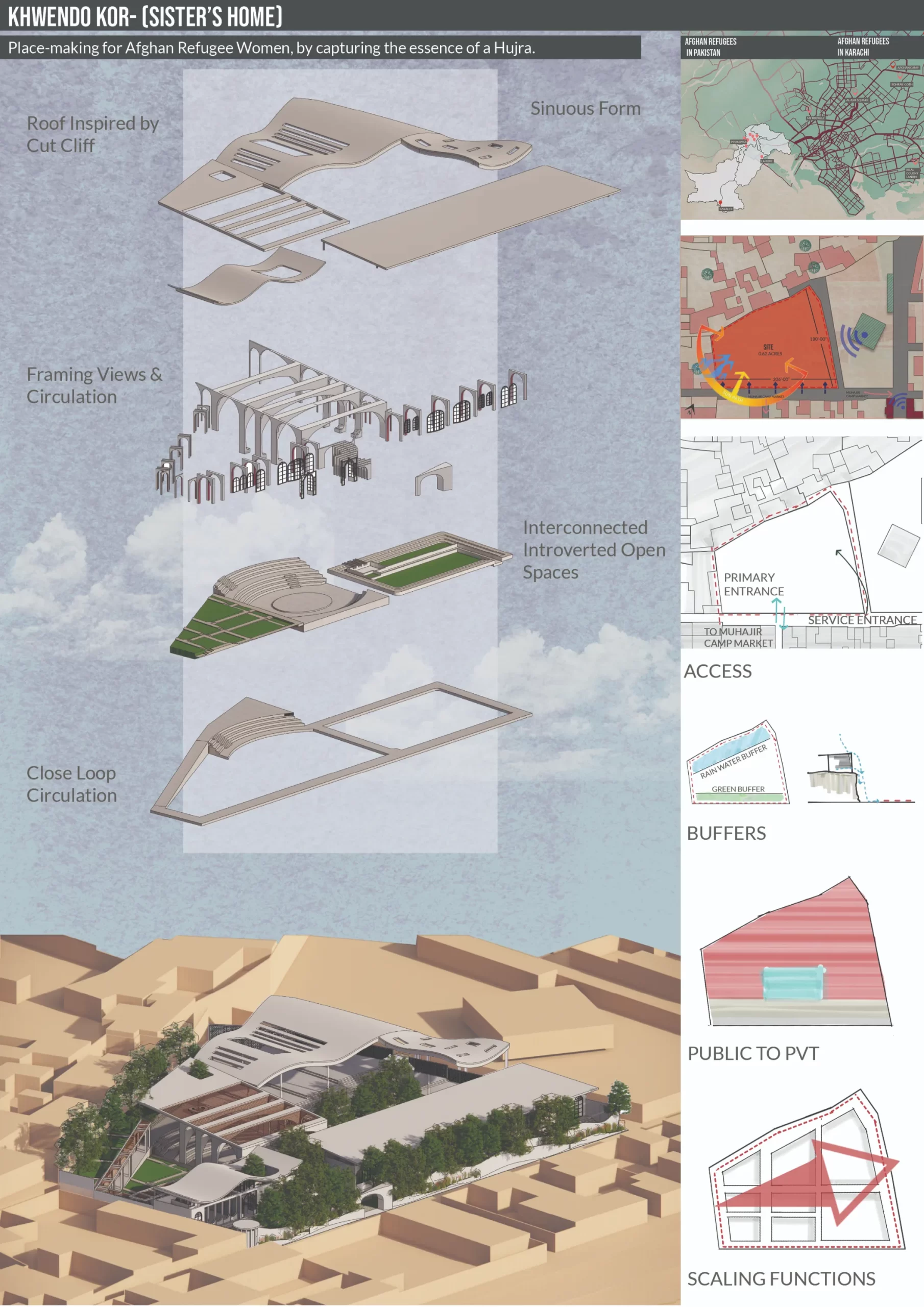
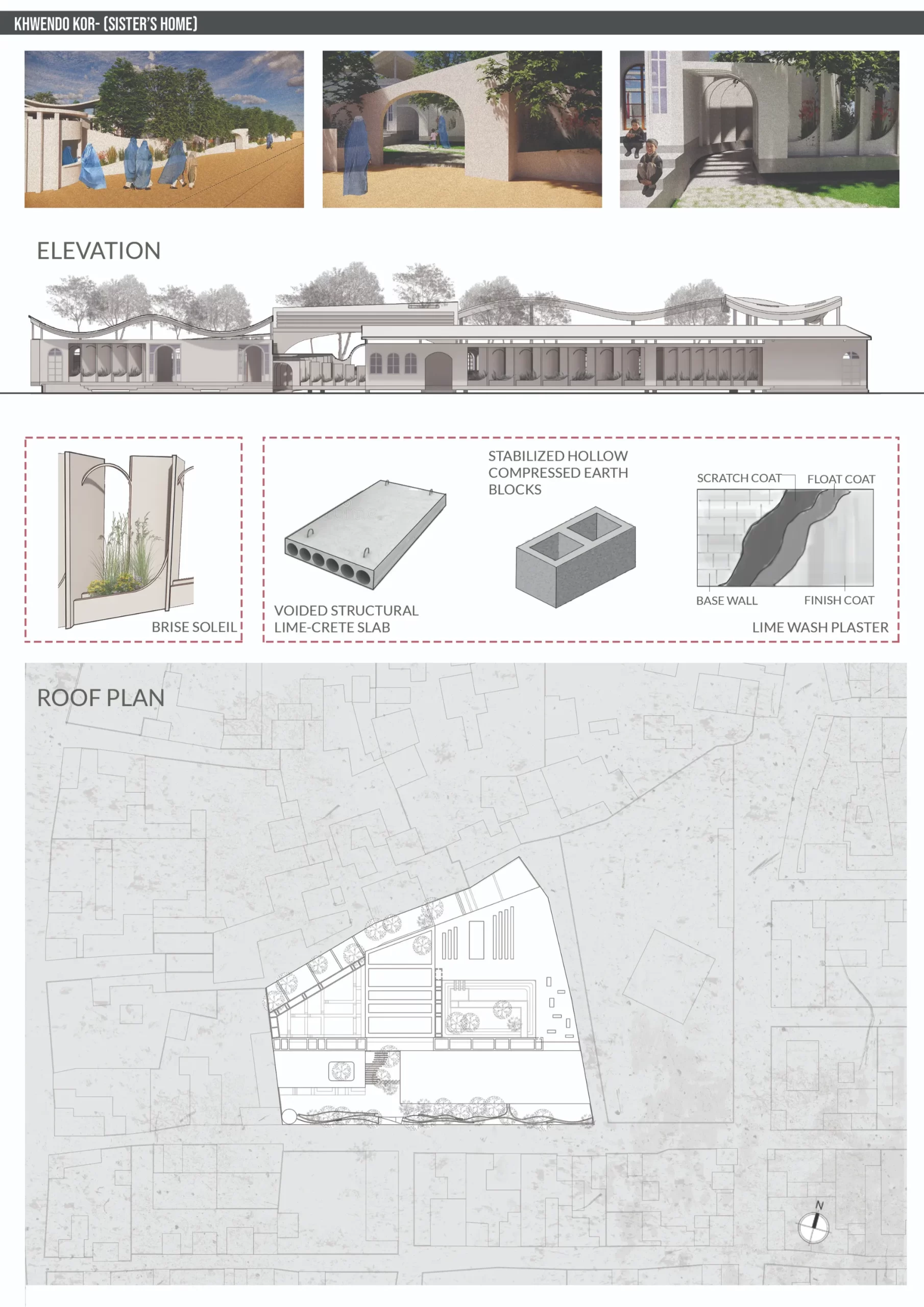
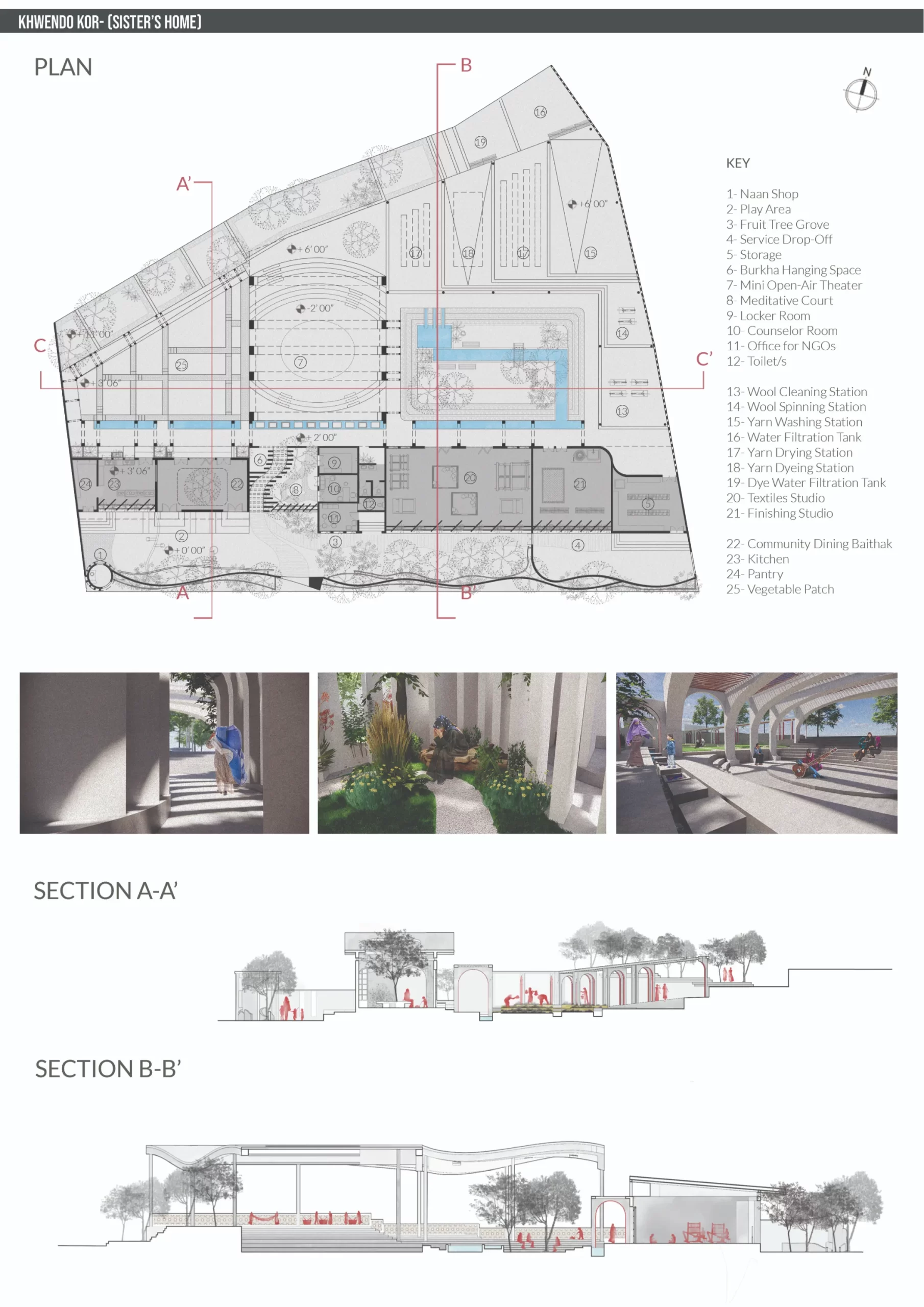
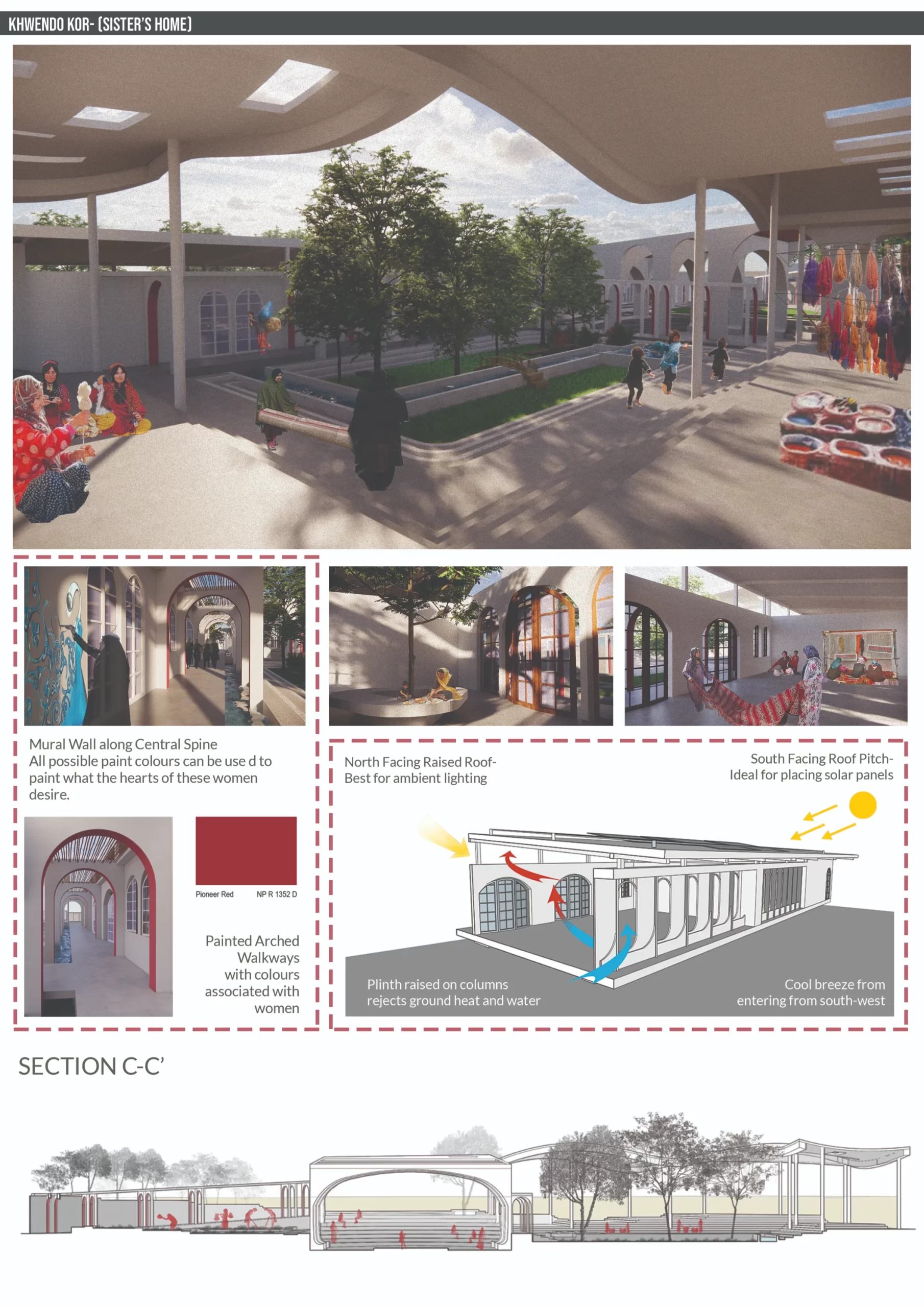
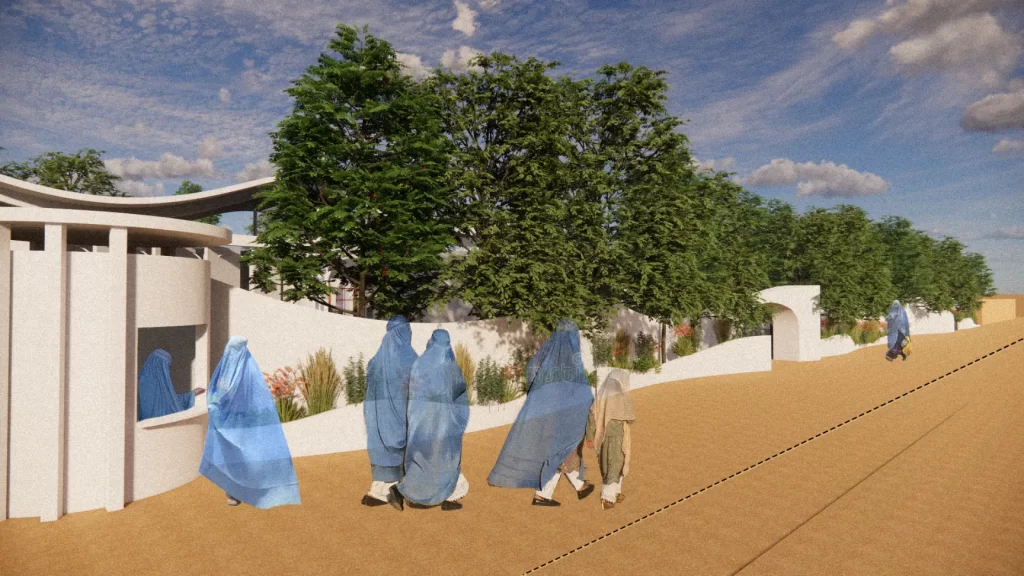
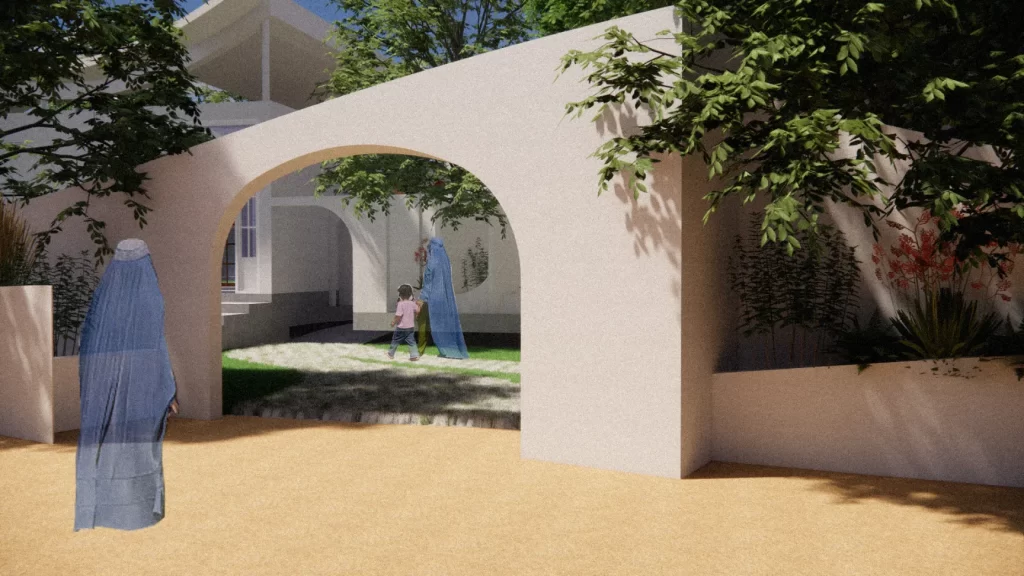
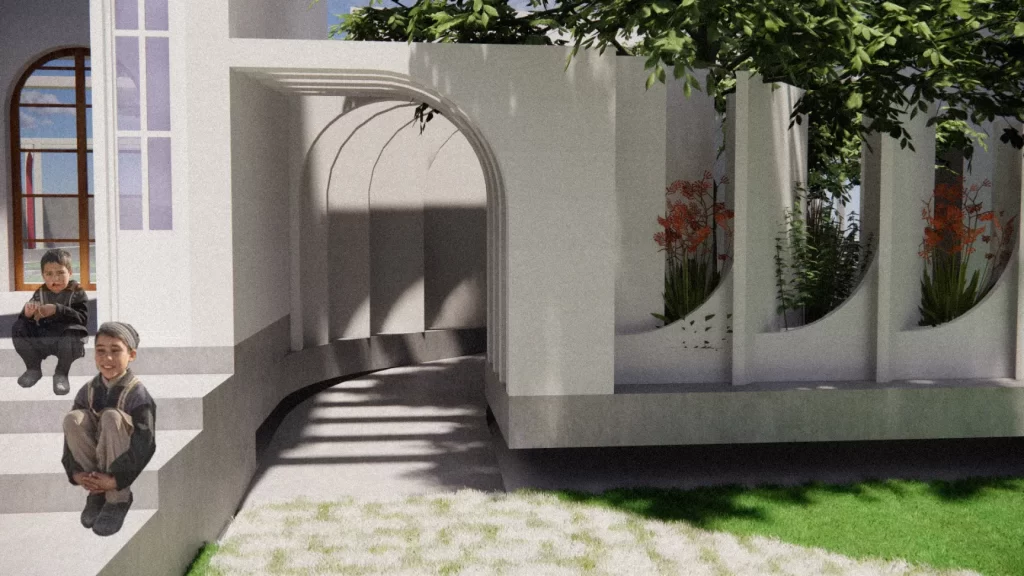
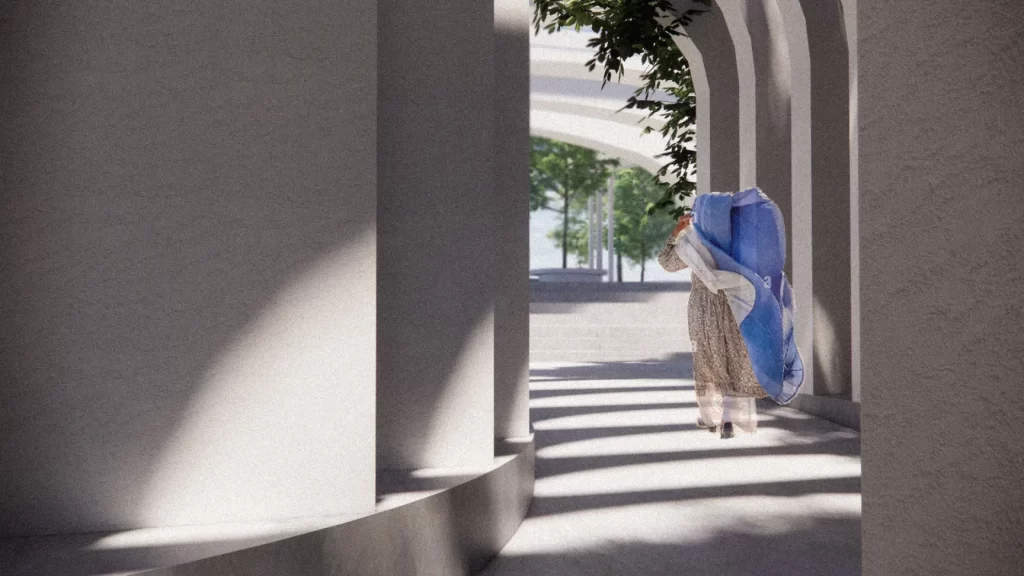
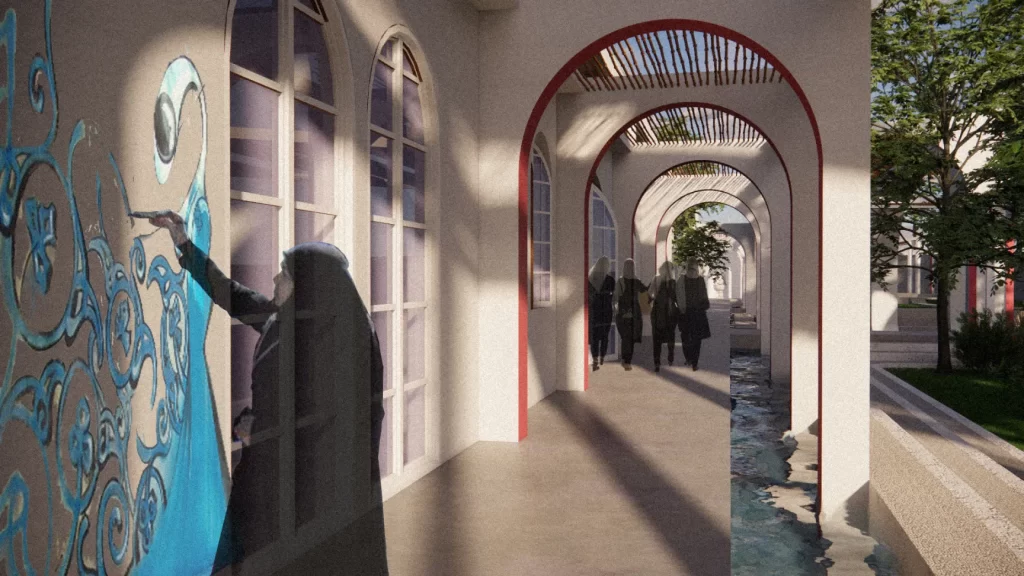
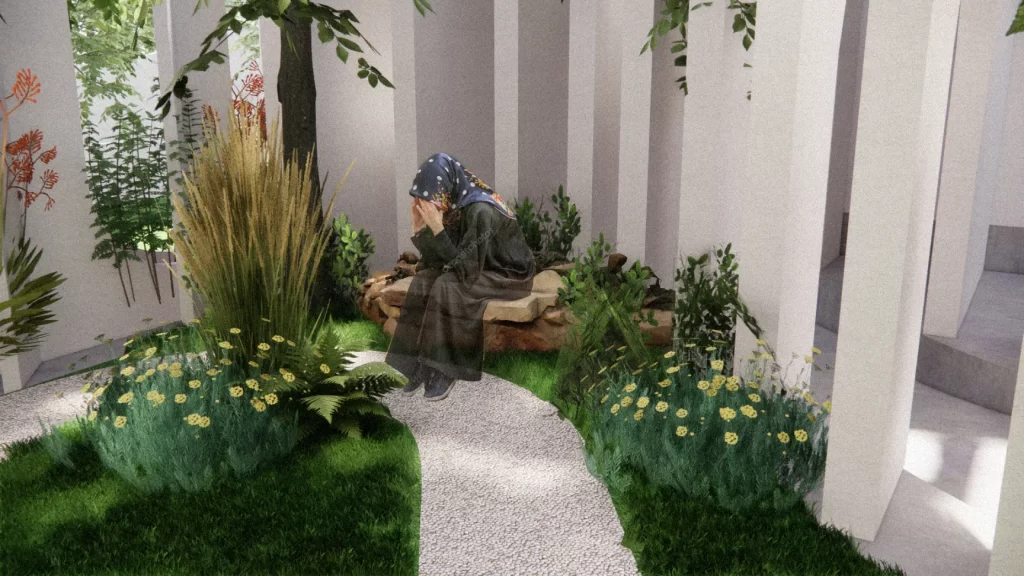
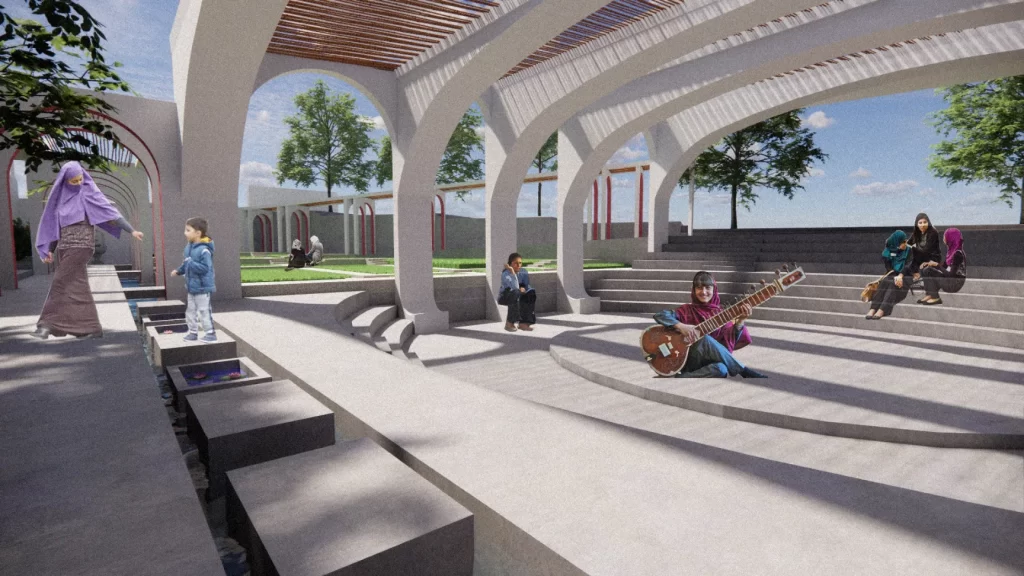
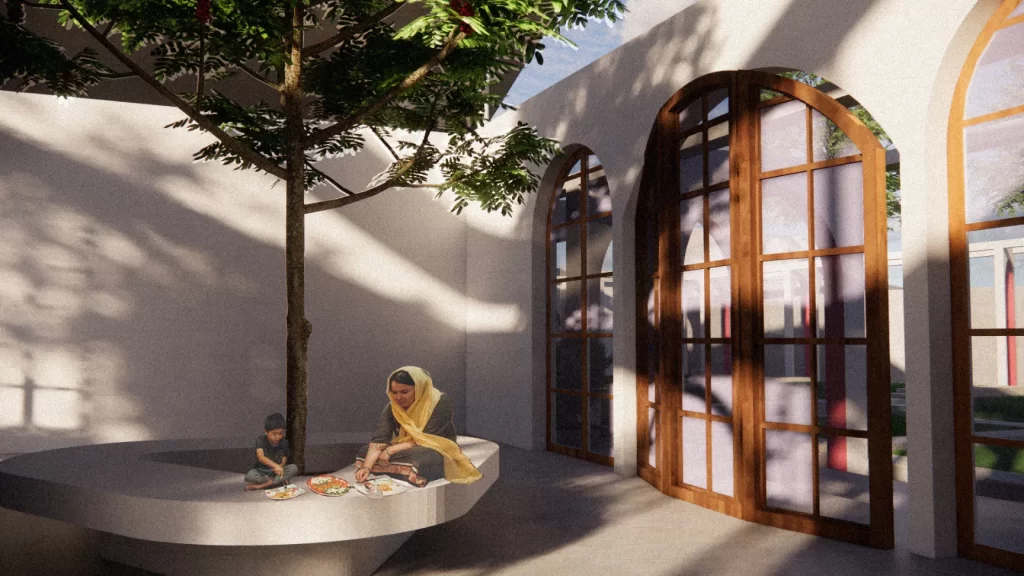
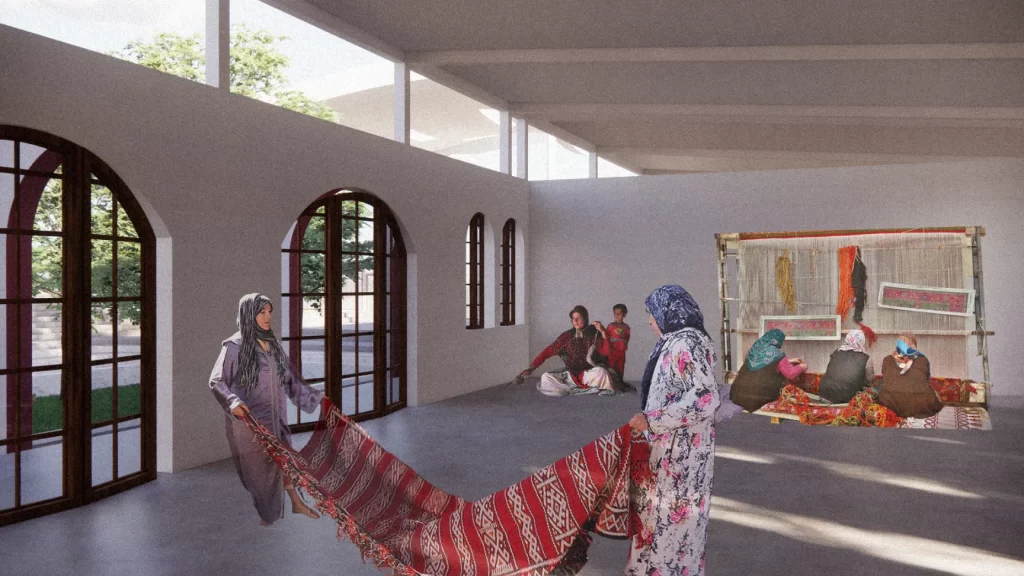
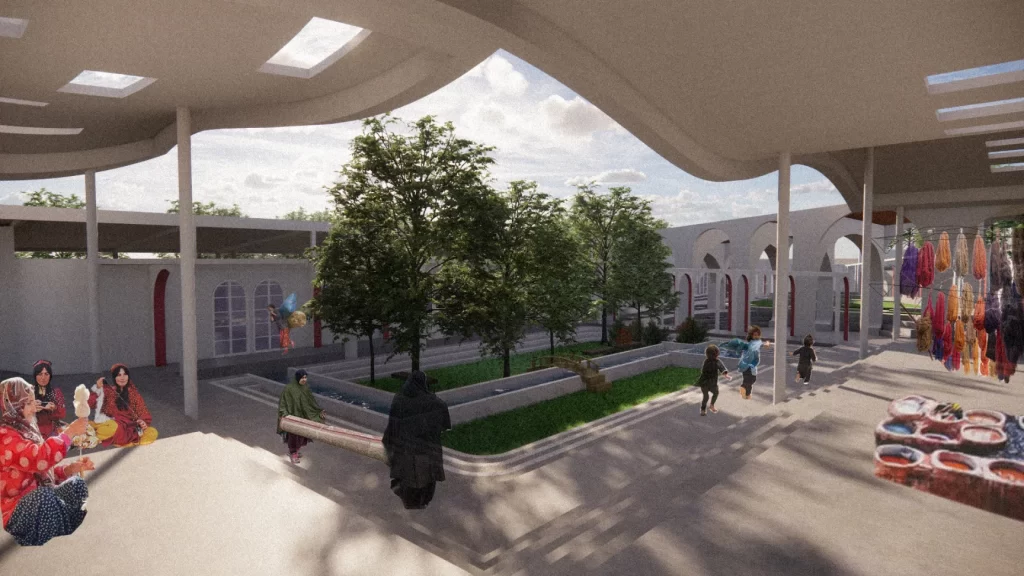
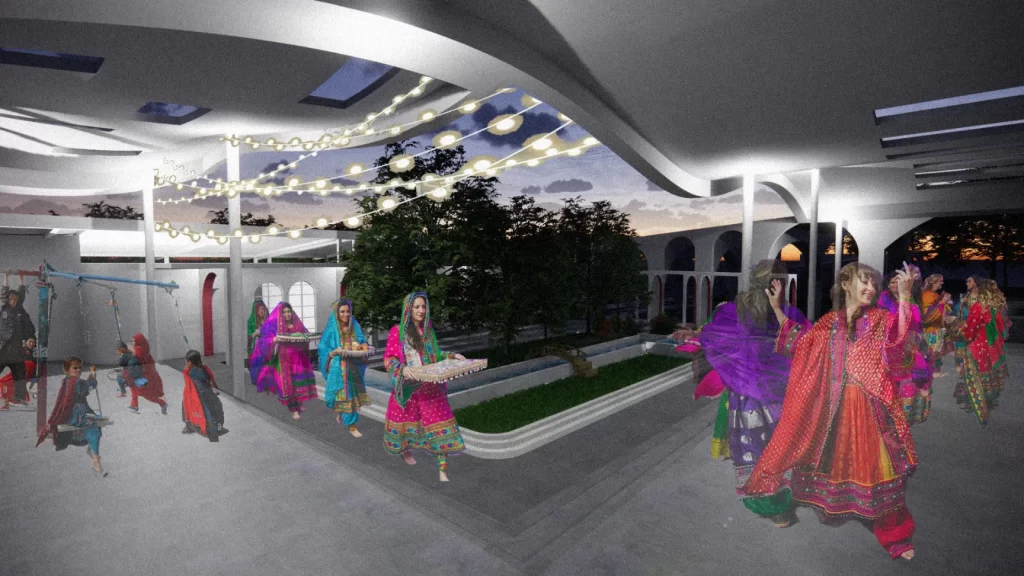
Showcase your design to an international audience
SUBMIT NOW
Image: Agrapolis Urban Permaculture Farm by David Johanes Palar
Top
Sister’s Home Place-making through creation of an opportunity and learning centre for Afghan refugee women in Karachi, by capturing the essence of a “Hujra”. A refugee lives through 2 wars, one that is going on in their homeland, and the other that is waged against them at their host country where they are labelled as “others”. Away from their “legal-homeland”, their inter-community bonds are broken, power dynamics and social hierarchies are further amplified; leading them to question their own role in the society, they feel placeless. After 43 years of Pakistan hosting Afghan refugees, the refugee camps have transformed into informal settlements, with their own ecosystems. In Karachi’s Afghan Basti, the ungoverned eco-systems strongly govern, and control the lives, movement and opportunities of women in the basti. They have no place to seek refuge in the entire refugee camp. The project explores place-making through the creation of a “sister’s home”, a community centre for women, that helps reestablish broken inter-community bonds. It helps validate their citizenship and right to living and personal growth, as it’s a permanent structure made exclusively for them, in an “impermanent camp”. It aids in creating a sense of belonging, by understanding the phenomenology of Afghan spaces and culture. The process is participatory, and place-making is achieved through creation of multi-purpose and multi-functional communal spaces. Simultaneously it gives them agency to reshape their lives as it will provide spatial and financial agency. This was done keeping in mind the language of space, how the spatial order, proximity, organisation all dictate the relationship between the people occupying it, as well as the relationship between the space itself and places surrounding it. PUSHING THE RESET BUTTON: The “Sister’s Home” is a place by the women for the women. A sense of belonging is created as the space becomes a rostrum for creation of ‘tangible cultural heritage’ and ‘intangible cultural connections’, through a series of interconnected courts and pavilions. Economical Reset- Although a flexible space, the main program of the project is an Afghan carpet-making and traditional Afghan embroidering facility, and a community kitchen. The former is providing employment for the women in the basti. While the latter is supplemented with a vegetable garden and fruit tree grove so that a self-sustaining soup kitchen is created for the women of the basti. Social Reset- The project explores the source of its user’s melancholy, and becomes a place that makes them feel like they “belong”. The architecture itself becomes a vessel for healing as its invites women from across the basti to share their woes, it becomes an arena for story-telling. Simultaneously it acts as a physical refuge to sit amongst nature by yourself or in a group to work towards a better self. Besides that, the program entails a counselling room that can help resolve one’s own personal issues or issues amongst groups, through professional help. Environmental Reset- In the densely built Aghan Basti void of vegetation, the project emerges as a green oasis; with 75% of the plot unbuilt, while 65% is green spaces. Structurally the architecture steers away from the harsh lines and geometry of the basti, incorporating more sinuous forms that is not only a reminder of geographies that once existed, but also announces itself to be a space that is feminine. Femininity is also seen through use of integration of colours typically associated with women. Besides that, the materiality of the space is one to last, unlike the impermanent mud construction seen across the basti. However, the planning of the space takes cues from existing Afghan architectural typologies, of residences and Hujras. Cultural Reset- A Hujra is a place in Afghani culture reserved for its men, it acts as a parliament, a meeting and gathering space, a place to learn, create and earn, a place to get entertained and share joys and sorrows. However, women do not have such space in Afghan culture. It was noted that the streets have become a modern day hujra, however since the women can’t overtake the streets, the project then becomes one for them. A primary physical street running across the programs of the project, and the closed loop circulation increases the chance encounters and provides fleeting glances to build familiarity with one another to help strengthen the sense of community. The apertures and colonnades in the project frame the movement and moments, as mode of story-telling; that materialises itself as conversations during carpet weaving or cooking then sharing a meal at the soup kitchen or while entertaining at the mini theatre. The theatre also doubles as a place to teach and learn transforming into a classroom. And when days’ work is over, the entire scheme can metamorphose into gathering space for festivities like Eid, Nowroz, weddings, etc. once again bringing the women together.














